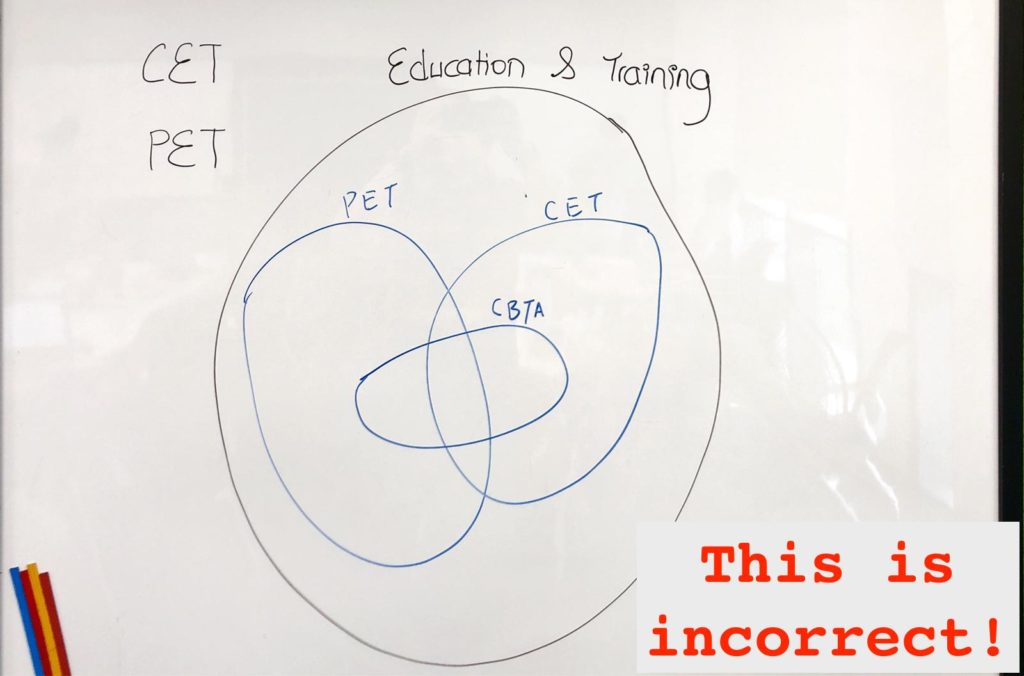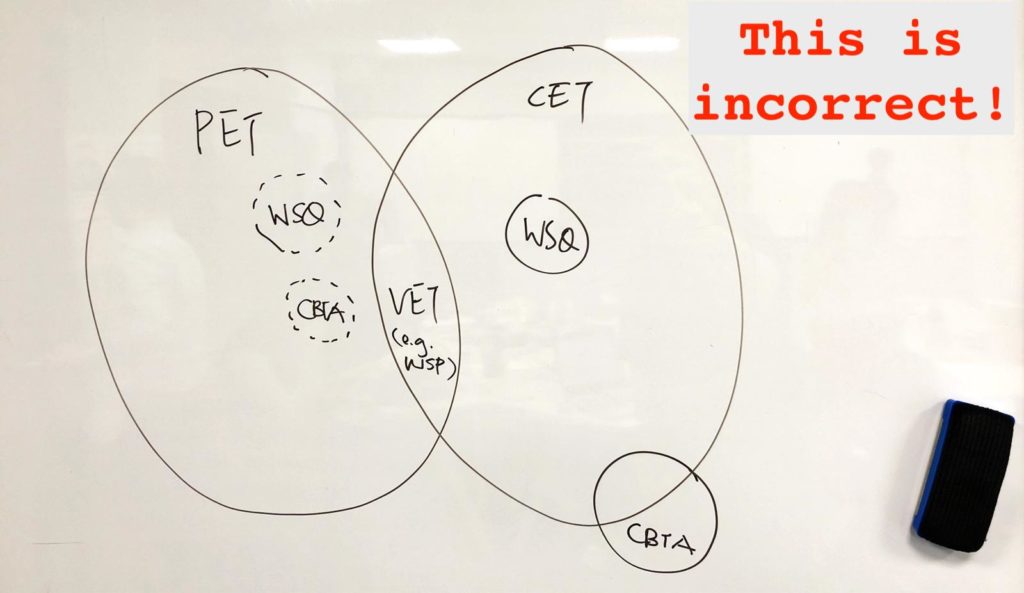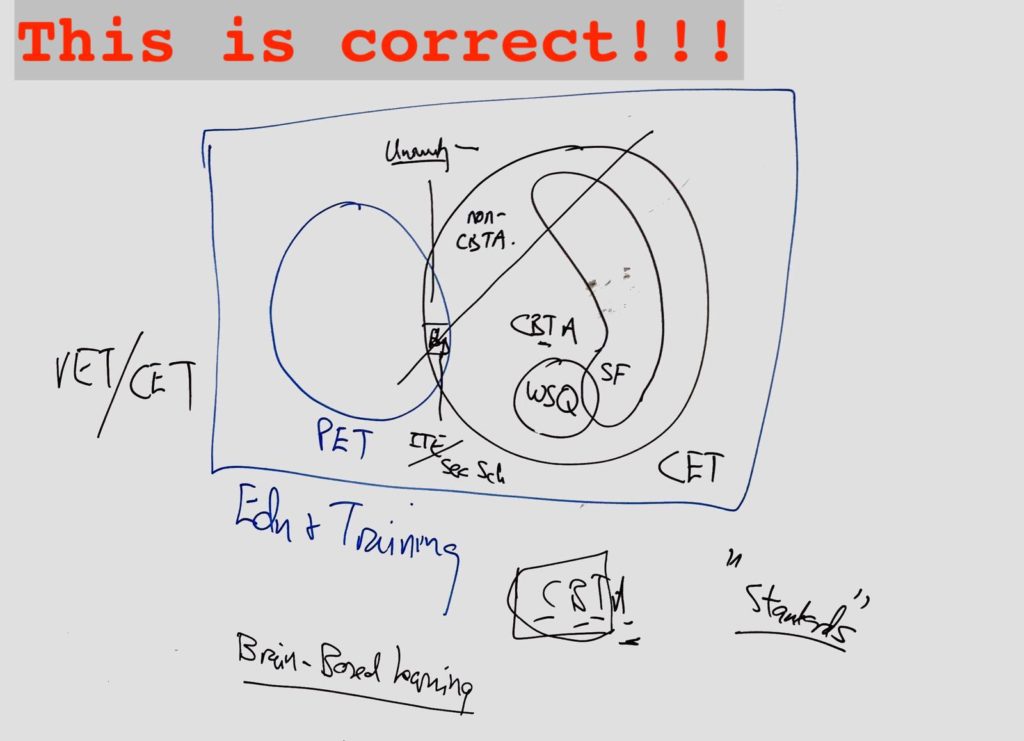
Context: I’m pursuing a WSQ Diploma in Adult and Continuing Education (DACE). As part of my first module, CM1: Develop Practice Through Reflection (RP), I’m keeping an online journal of my reflections with artifacts (pictures). Hope it works out!

When you go for courses for CET (Continuing Education and Training), also known as CPD (Continuing Professional Development), or basically any course that you attend as an adult, you’ll notice that discussions are one of the main techniques for learning. This is because it’s generally acknowledged that this helps with the retention of learning and knowledge.
What this entails is usually a discussion where you draw/write out what you know or think, sometimes on a board, sometimes on a piece of scratch paper. The purposes are varied – it can be to activate prior knowledge (schema), as a form of brainstorming, to show diversity of perspectives, and other key words that you’ll see a lot when it comes to andragogy.

So anyway, we were on the first day of Core Module 2: Review Competency-Based Training Approaches for Adult Workers (CBT). Our trainer, Trainer S (to differentiate him from my classmate who will also be referred to as S in the future), was asking us share the connection between a few different acronyms – PET, CET, VET, WSQ, and CBTA.
We were asked to draw a Venn diagram, presumably to show our understanding of how it all overlaps/intersects. Trainer S divided us into groups and then gave us ten minutes to do this.

5 minutes later (we were given 10 minutes), he called a halt to the activity, and told us to gather around him. He said that he would normally let us discuss for such learning activities, but this time he would stop us and share more about it with us directly.
From the expression on his face, it was quite obvious that something was wrong. That, coupled with his instructions (he would explain it to us directly), led me to realise that we were completely off track in our understanding of CET and PET. I was a bit disappointed that we didn’t get to work it out for ourselves, and I kind of wanted to arrive at the correct conclusion with my group.

S elicited the answers from us (as much as possible) and drew out the diagram for us. We were off track, and I think that was because some of us had not revisited this topic for a while, or we had focused on other aspects of this topic (me lah) when revising.

In hindsight, I realised that this was the most optimal decision on the trainer’s part. He could have gone around to each group and course corrected them, but how long would it take? In addition, it would have meant that most groups would be floundering around with the wrong concept for a while – and the longer we fumbled with the wrong concept, the higher the likelihood that we would internalise that (wrong) understanding of the topic.

For me, I think I would have pressed on – I’m not sure if I would have adapted my approach and gone for direct instruction. I probably would have overran, and I might have needed to cut some future activities. I generally don’t like telling students that they’re wrong straight in the face, because it’s demoralising. Although S didn’t do that, I think he did it in the most polite way possible.

So my takeaway from this is – although direct instruction is usually not recommended and that we should use other forms of learning to help in retention of information, it does have its place. I think S weighed the pros and cons of the situation, and decided that the time saved and the accuracy of knowledge imparted was more important than us figuring it out ourselves. We might have taken too long, and it would have impacted the timing for the rest of our lesson. For the sake of efficiency and deliverables, direct instruction was the best way to intervene in a learning activity gone haywire.
I like S’ flexibility (I think it comes with experience too), and I hope to be as adaptable as him when it comes to the methods I use for teaching in the future.

This is an original article on marcusgohmarcusgoh.com.
Follow Marcus Goh (yes, referring to myself in third person) on Facebook and Instagram for more (presumably) good updates!
I’m an independent scriptwriter who’s written for popular shows like Lion Mums, Crimewatch, Police & Thief, and Incredible Tales. I’m also a Transformers enthusiast and avid pop culture scholar. You can find me on social media as Optimarcus and on my site.
Send me an email if you want to get in touch!
Leave a Reply